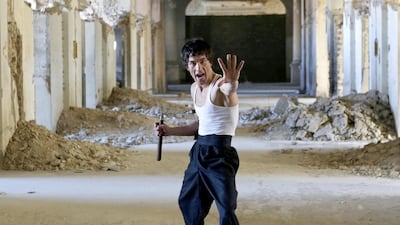From the ruins of a bombed-out palace near Kabul, a young Afghan man bearing a striking resemblance to kung fu legend Bruce Lee is high-kicking his way to internet fame, aiming to show another side to his war-weary nation.
Videos and photos of Abbas Alizada, 20, posted on the Facebook page “Bruce Hazara”, show him performing backflips and striking Lee’s famous poses. They have blazed through Afghanistan’s small internet community, part of a publicity burst he hopes will catapult him to broader fame.
“I want to be a champion in my country and a Hollywood star,” Alizada says at Kabul’s desolate Darul Aman Palace, where he trains twice a week, swirling nunchakus and sporting a Lee-like bowl haircut.
During a workout at the palace, adorned with photos of thousands of civilian war victims as part of a protest exhibition, Alizada showed off his wiry physique, doing push-ups on his fingertips and sparring with a partner. Two assistants dabbed his brow and fixed his hair for the cameras.
Alizada is one of 10 children from a poor family. His parents could not afford the fees at an academy of Wushu, a Chinese mixed martial art, but a trainer took him under his wing.
Darul Aman Palace, built in the 1920s by King Amanullah Khan, was damaged by decades of fighting for control of the capital. It is now a ruin scarred by artillery craters and bullet holes, overlooking an as-yet-unfinished national parliament building.
“The destruction here makes me sad, but it also inspires me,” says Alizada, who refused to be filmed in one room where the walls were daubed with graffiti reading “death to Americans”.
He rejects the name Bruce Hazara given to him by friends in recognition of his ethnic heritage, saying he prefers to be known as the Afghan Bruce Lee in a country riven by tribal divides.
Questions of national unity are poignant in Afghanistan, where Taliban insurgents are flexing their muscles with near-daily attacks. This year has been the bloodiest of the war, as foreign troops drastically reduce their presence.
Alizada’s recent success, on the internet and at a martial arts tournament in Kabul, reflects some of the changes in the country since the American-led intervention toppled the Taliban after the attacks of September 11, 2001.
Helped by the spread of TV and the internet, Afghanistan has witnessed a rapid rise in interest in sports under the government that succeeded the hardline Islamists, who had banned television, many sports and martial arts.
“The only news that comes from Afghanistan is about war ... I am happy that my story is a positive one,” Alizada says.

